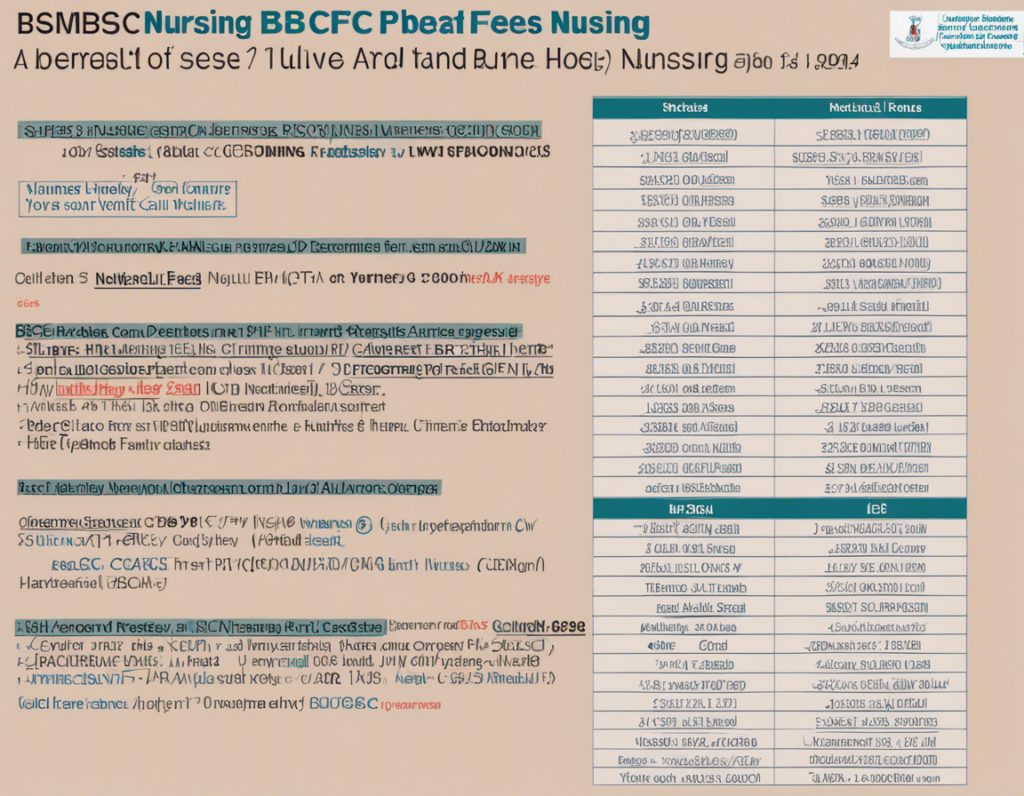Are you considering pursuing a Bachelor of Science in Nursing (BSc Nursing) but worried about the fees associated with the program? Understanding the financial aspects of your education is crucial in making informed decisions about your future. In this comprehensive guide, we will delve into BSc Nursing fees, exploring the factors that influence the cost of your education, potential sources of funding, and tips for managing your expenses effectively.
Factors Influencing BSc Nursing Fees
The cost of pursuing a BSc Nursing degree can vary significantly based on several factors. Here are some key elements that influence BSc Nursing fees:
1. Institution
Different universities and colleges may have varying tuition fees for their BSc Nursing programs. Public institutions generally have lower tuition rates for in-state residents compared to out-of-state students or private institutions.
2. Program Duration
The duration of the BSc Nursing program can impact the overall fees. A typical BSc Nursing program ranges from three to four years, with longer programs resulting in higher tuition costs.
3. Location
The cost of living in the city or region where the institution is located can also affect BSc Nursing fees. Urban areas tend to have higher living expenses, including accommodation, transportation, and other costs.
4. Additional Expenses
In addition to tuition fees, students may incur expenses for textbooks, uniforms, clinical equipment, and licensing exams. These additional costs should be factored into your overall budget for pursuing a BSc Nursing degree.
Sources of Funding for BSc Nursing Programs
While BSc Nursing fees can be substantial, there are various sources of funding available to help aspiring nurses finance their education. Here are some common options for funding your BSc Nursing studies:
1. Scholarships and Grants
Many universities, private organizations, and government bodies offer scholarships and grants specifically for nursing students. These financial awards do not need to be repaid and can significantly reduce the burden of BSc Nursing fees.
2. Student Loans
Student loans are another common way to fund your BSc Nursing education. Federal and private student loans offer flexible repayment options, low interest rates, and may cover tuition fees as well as living expenses.
3. Work-Study Programs
Some institutions offer work-study programs that allow students to work part-time while studying. These positions can provide valuable work experience in the healthcare field while helping to offset BSc Nursing fees.
4. Employer Sponsorship
If you are already working in a healthcare setting, your employer may offer tuition reimbursement or sponsorship for your BSc Nursing degree. This can be a cost-effective way to advance your career while minimizing out-of-pocket expenses.
Tips for Managing BSc Nursing Expenses
To effectively manage BSc Nursing fees and ensure a smooth financial journey throughout your education, consider the following tips:
- Research and compare tuition fees at different institutions to find a program that fits your budget.
- Create a detailed budget that includes tuition, living expenses, and additional costs to avoid financial surprises.
- Explore all available funding options, including scholarships, grants, loans, and employer assistance programs.
- Consider part-time work or freelance opportunities to supplement your income and reduce reliance on student loans.
- Prioritize financial literacy and seek guidance from financial aid advisors to make informed decisions about funding your education.
Frequently Asked Questions (FAQs)
1. What is the average cost of BSc Nursing fees in the United States?
The average cost of tuition for a BSc Nursing program in the US ranges from $20,000 to $40,000 per year, depending on the institution and location.
2. Are there any fully funded BSc Nursing programs available?
While fully funded BSc Nursing programs are rare, some institutions offer scholarships and assistantships that cover tuition fees for selected students.
3. Can international students apply for financial aid to cover BSc Nursing fees?
International students studying in the US may be eligible for scholarships, loans, or work-study programs to help finance their BSc Nursing education.
4. Are there specialized grants available for students pursuing advanced nursing degrees?
Yes, there are grants specifically tailored for students pursuing advanced nursing degrees, such as Master of Science in Nursing (MSN) or Doctor of Nursing Practice (DNP).
5. How can I estimate the total cost of BSc Nursing fees for my entire academic program?
To estimate the total cost of your BSc Nursing degree, add up the tuition fees for each semester or year, as well as projected expenses for textbooks, uniforms, exams, and living costs.
In conclusion, understanding the various factors that influence BSc Nursing fees and exploring funding options are essential steps in planning for your nursing education. By researching program costs, seeking financial aid opportunities, and managing your expenses wisely, you can pursue your passion for nursing while minimizing the financial burden of your education.
